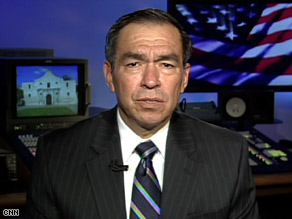
The former commander of U.S. forces in Iraq who retired over the Abu Ghraib prison scandal is calling for a truth commission to investigate Bush-era policies behind the abuse and controversial interrogations of detainees.
“The mechanisms that are responsible for establishing accountability have lost their credibility within the country, and there’s a lack of trust in them,” retired Lt. Gen. Ricardo Sanchez said in an interview on CNN’s “Newsroom” Tuesday. “A truth commission, I believe, is the only way for us to regain that.” The Iraq war, he said, was plagued by “institutional and individual failures” — both in the execution of the conflict and the interrogation tactics, and in the policies from Washington that were implemented in the field. Sanchez, in charge of combat operations from 2003 into 2004, has been a harsh critic of the war in Iraq, calling it in 2007 a “nightmare with no end in sight.” His leadership has been criticized because the mistreatment of prisoners at the notorious Abu Ghraib prison happened during his command. Pictures of detainees caused outrage around the world when they were leaked to the news media in May 2004 — photos showing naked prisoners stacked on top of each other, or being threatened by dogs, or hooded and wired up as if for electrocution. Critics say such tactics amount to torture.
Don’t Miss
Abu Ghraib head finds vindication in newly released memos
‘No one is above the law,’ Holder says of torture inquiry
Report: Bush-era officials authorized detainee abuse
Interrogations may have worked, Obama official says
Two officers — Army Col. Janis Karpinski, then a brigadier general and commander of Abu Ghraib, and Col. Thomas Pappas, the commander of the military intelligence unit assigned to Abu Ghraib — were punished over the aggressive interrogations. Seven low-ranking guards and two military intelligence soldiers — described by then-Deputy Secretary of Defense Paul Wolfowitz as “bad apples” — were disciplined. Karpinski in April told CNN she was ordered by Sanchez not to discuss the photographs or the subsequent investigation with anybody. A federal investigation cleared four other senior officers in 2005, including Sanchez. But the scandal was hard to shake off, and he retired the following year after more than three decades of Army service. “You know, I can’t get away from this,” Sanchez told CNN Tuesday. “The fact is that I am associated, and will always be associated, with Abu Ghraib. … It doesn’t bother me. I think it’s something I’ve learned to live with. But I also live with the fact, as I’ve stated before, that I’ve never compromised my integrity or my honor in the course of this ordeal.” Recently released Bush administration Justice Department memos condone the use of such tactics as keeping a detainee naked and in some cases in a diaper, and putting detainees on a liquid diet. One memo said aggressive techniques such as waterboarding, sleep deprivation and slapping did not violate laws against torture absent the intent to cause severe pain. A Senate Armed Forces Committee report released in April, when the memos surfaced, found that senior Bush administration officials authorized aggressive interrogation techniques on suspected terrorists, despite concerns expressed by military psychologists and attorneys. The report points to then-Defense Secretary Donald Rumsfeld’s approval of such techniques — including stress positions, removal of clothing, use of phobias (such as fear of dogs), and deprivation of light and auditory stimuli — in December 2002 for detainees at the U.S. prison in Guantanamo Bay, Cuba. His OK prompted interrogators in Afghanistan and Iraq to adopt the aggressive techniques. “We had different departments that faltered in developing the guidance for executing those policies,” Sanchez said. “And then I think we also had a dereliction of duty at those levels when we were faced with the reality and the facts that abuses were occurring on the ground as early as 2002 and we refused to do anything about it.” He said the lack of oversight and guidance from Washington and top brass left his troops “abandoned on the battlefield.” Last year he published his memoirs titled, “Wiser in Battle: A Soldier’s Story,” and he has continued to be a vocal critic of the war. “Until America can really understand what has happened and look at it objectively and truthfully, we will still continue to be mired in the past,” Sanchez said. “We’ve got to learn the lessons and never go this way again.”